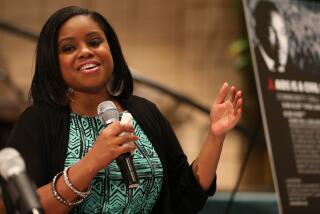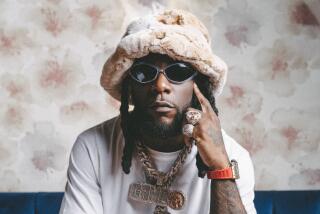TV Reviews : Crusade Against AIDS by African Pop Singer
- Share via
There are celebrities who put out for a cause, and then there are celebrities who put their lives on the line.
“Born in Africa,” a joint production of “Frontline” and “The AIDS Quarterly” (tonight at 9 p.m. on Channels 28 and 15, and at 10 p.m. on Channel 50), follows Ugandan pop singer Philly Bongoley Lutaaya during 1989, the last year of his life, when he became the first famous African to publicly reveal that he was fatally afflicted with AIDS.
Lutaaya did record a few songs during that time--tunes of support and sympathy for AIDS victims--but most of the time was spent traversing his country, spreading the word of caution against a disease that not even the village medicine man can cure.
The singer, dubbed Uganda’s Bruce Springsteen by narrator Peter Jennings and a hero by many others, did not always encounter open arms during his crusade. This pop idol’s earlier admission that he had the disease broke social taboos of going public on the subject, and also raised suspicions that he was seeking publicity. Only through the cajoling of Adjoa Amana of the United Nation’s World Health Organization was he convinced of the compelling need for a public educational campaign. Even during the campaign, Lutaaya was the object of yellow journalism.
This suggests a dramatic, emotionally powerful account of one man’s struggle. “Born in Africa,” though, becomes somewhat soft at the center, a nearly weepy elegy of a man’s self-sacrificing goodness (the energy needed for the campaign seems to have hastened Lutaaya’s death in December). The content of the superstar’s message is very familiar to any American who’s been awake for the past eight years.
Lutaaya’s very presence, his ability, in the words of one official, to “give AIDS a face,” is a throughway into Africa’s newest and possibly most devastating tragedy. Since the disease is spread almost purely through heterosexual contact in Africa, Lutaaya’s journey takes him into every social sector, from women’ conferences to Muslim services to truck stops on the Trans-African Highway. Alas, we hear too little from everyday Ugandan citizens to know if Lutaaya’s message ever got through.


